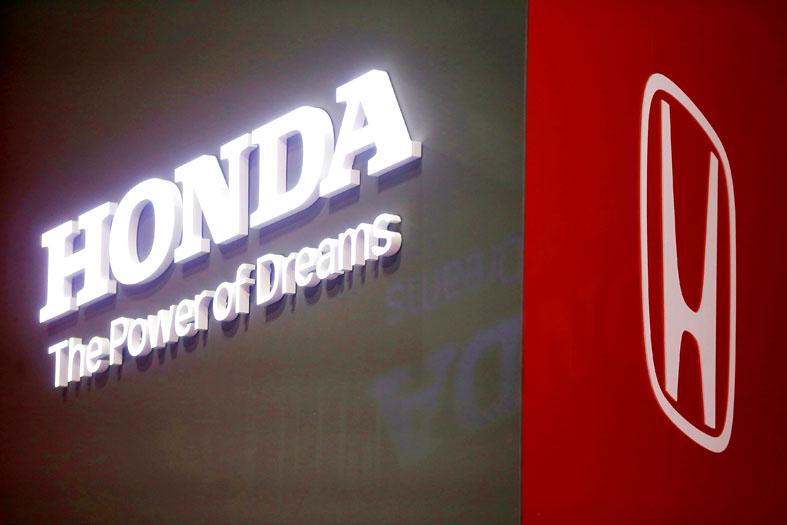Honda Motor Co plans to suspend production at some plants in the US and Canada next week as the COVID-19 pandemic, a chip shortage and severe winter weather have affected its supply chain, a company spokesperson said.
The automaker is to halt work at plants in Marysville and East Liberty in Ohio, as well as others in Indiana, Alabama and Ontario, potentially for a week, the spokesperson said yesterday, without specifying the volume of vehicles affected.
Honda made 1.45 million vehicles in North America last year, down 20 percent from 2019. The Japanese company has 12 manufacturing plants in the US and one in Canada.

Photo: Reuters
Separately, Toyota Motor Corp said that the cold front had reduced supply of petrochemical products, affecting production in the US and Mexico.
Some lines, shifts or potentially entire plants are expected to be temporarily halted for several days in Kentucky, West Virginia and Mexico, spokeswoman Shiori Hashimoto said, without providing further details.
The bad weather has added to disruptions for automakers already battling a shortage of semiconductors, which are being gobbled up by consumer electronics companies trying to meet an increase in demand from users stuck at home during the pandemic.
Honda and Toyota already scaled back output at plants around the world earlier this year due to the lack of chips. Major tech companies have also warned about a serious imbalance in supply.
Mitsubishi UFJ Morgan Stanley Securities Co has said the shortage could reduce Honda’s output by 300,000 units, while Toyota is less affected, because it is not as reliant on foreign semiconductor companies.
In Europe, the auto industry reported its worst February sales in eight years, because much of the region remains locked down to contain the pandemic.
Registrations plunged by one-fifth to 850,170 vehicles, the lowest total for the month since 2013, the European Automobile Manufacturers’ Association said.
Spain led declines among major markets with a 38 percent fall, while the UK shrunk 36 percent.
Europe’s struggle to inoculate citizens from COVID-19 risks tainting automakers’ more upbeat forecasts for the year.
Shuttered showrooms, slow vaccination distribution and economic damage caused by the virus call into question the high expectations for earnings recovery, Bloomberg Intelligence analyst Michael Dean said.
Among the continent’s biggest automakers, deliveries for Renault SA fell the most at 29 percent, followed by Stellantis NV at 22 percent. Both manufacturers count the region as their most important sales hub.
Volkswagen AG fared marginally better with a 19 percent decline.

Hong Kong authorities ramped up sales of the local dollar as the greenback’s slide threatened the foreign-exchange peg. The Hong Kong Monetary Authority (HKMA) sold a record HK$60.5 billion (US$7.8 billion) of the city’s currency, according to an alert sent on its Bloomberg page yesterday in Asia, after it tested the upper end of its trading band. That added to the HK$56.1 billion of sales versus the greenback since Friday. The rapid intervention signals efforts from the city’s authorities to limit the local currency’s moves within its HK$7.75 to HK$7.85 per US dollar trading band. Heavy sales of the local dollar by

Taiwan Semiconductor Manufacturing Co’s (TSMC, 台積電) revenue jumped 48 percent last month, underscoring how electronics firms scrambled to acquire essential components before global tariffs took effect. The main chipmaker for Apple Inc and Nvidia Corp reported monthly sales of NT$349.6 billion (US$11.6 billion). That compares with the average analysts’ estimate for a 38 percent rise in second-quarter revenue. US President Donald Trump’s trade war is prompting economists to retool GDP forecasts worldwide, casting doubt over the outlook for everything from iPhone demand to computing and datacenter construction. However, TSMC — a barometer for global tech spending given its central role in the

The Financial Supervisory Commission (FSC) yesterday met with some of the nation’s largest insurance companies as a skyrocketing New Taiwan dollar piles pressure on their hundreds of billions of dollars in US bond investments. The commission has asked some life insurance firms, among the biggest Asian holders of US debt, to discuss how the rapidly strengthening NT dollar has impacted their operations, people familiar with the matter said. The meeting took place as the NT dollar jumped as much as 5 percent yesterday, its biggest intraday gain in more than three decades. The local currency surged as exporters rushed to

PRESSURE EXPECTED: The appreciation of the NT dollar reflected expectations that Washington would press Taiwan to boost its currency against the US dollar, dealers said Taiwan’s export-oriented semiconductor and auto part manufacturers are expecting their margins to be affected by large foreign exchange losses as the New Taiwan dollar continued to appreciate sharply against the US dollar yesterday. Among major semiconductor manufacturers, ASE Technology Holding Co (日月光), the world’s largest integrated circuit (IC) packaging and testing services provider, said that whenever the NT dollar rises NT$1 against the greenback, its gross margin is cut by about 1.5 percent. The NT dollar traded as strong as NT$29.59 per US dollar before trimming gains to close NT$0.919, or 2.96 percent, higher at NT$30.145 yesterday in Taipei trading